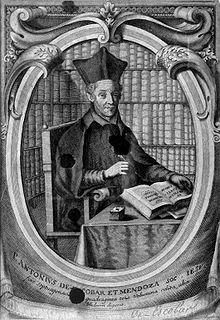- Antonio Escobar y Mendoza
-
Antonio Escobar y Mendoza (1589 – July 4, 1669) was a Spanish churchman of illustrious descent.
Born in Valladolid, he was educated by the Jesuits, and at the age of fifteen took the habit of that order. He soon became a famous preacher. In addition he was a voluminous writer, and his collected works fill eighty-three volumes. His first literary efforts were Latin verses in praise of Ignatius Loyola (1613) and the Virgin Mary (1618); but he is best known as a writer on casuistry. His principal works belong to the fields of exegesis and moral theology. Of the latter the best known are Summula casuum conscientiae (1627); Liber theologiae moralis (1644), and Universae theologiae moralis problemata (1652–1666).
The Summula was severely criticised by Blaise Pascal in the fifth and sixth of his Provincial Letters, as tending to inculcate a loose system of morality.[1] It contains the famous maxim that purity of intention may be a justification of actions which are in themselves contrary to the moral code and to human laws; and its general tendency is to find excuses for human frailties. His doctrines were disapproved of by many Catholics, and were mildly condemned by Rome. They were also ridiculed in witty verses by Molière, Boileau and La Fontaine, and gradually the name Escobar came to signify in France any person who is adroit in making the rules of morality harmonize with his own interests, a casuist.
Escobar himself is said to have been simple in his habits, a strict observer of the rules of his order, and unweariedly zealous in his efforts to reform the lives of those with whom he had to deal. It has been said of him that he purchased heaven dearly for himself, but gave it away cheaply to others.[citation needed]
Escobar died in Valladolid in 1669. In 1679 Pope Innocent XI publicly condemned sixty-five propositions, taken chiefly from the writings of Escobar, Suarez and other casuists as propositiones laxorum moralistarum and forbade anyone to teach them under penalty of excommunication[2].
Footnotes
- ^ J. Franklin, The Science of Conjecture: Evidence and Probability Before Pascal (Baltimore: Johns Hopkins University Press, 2001), 97-100.
- ^ Kelly, J.N.D., The Oxford History of the Popes, Oxford University Press, 1986. ISBN 0192820850
References
 This article incorporates text from a publication now in the public domain: Chisholm, Hugh, ed (1911). Encyclopædia Britannica (11th ed.). Cambridge University Press.
This article incorporates text from a publication now in the public domain: Chisholm, Hugh, ed (1911). Encyclopædia Britannica (11th ed.). Cambridge University Press.
Categories:- 1589 births
- 1669 deaths
- Catholic casuists
- Spanish Jesuits
- 17th-century Roman Catholic priests
- 17th-century Spanish people
Wikimedia Foundation. 2010.

